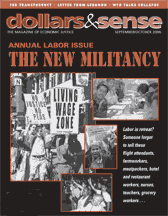Kentucky River Threatens to Swamp Labor
An NLRB ruling could eliminate millions of workers' right to unionize.
This article is from the September/October 2006 issue of Dollars & Sense: The Magazine of Economic Justice and is available at http://www.dollarsandsense.org
Subscribe Now
at a 30% discount.

This article is from the September/October 2006 issue of Dollars & Sense magazine.
Kentucky River. If the name doesn't worry you, you need to know more about the latest effort to eliminate labor unions. There are currently three cases, collectively referred to as the "Kentucky River" cases, working their way through the National Labor Relations Board (NLRB) that could ultimately deprive millions of U.S. workers of the right to union representation.
The cases are efforts to fine-tune a 2001 Supreme Court decision in NLRB v. Kentucky River Community Care. The Court ruled 5-4 that registered nurses at a Kentucky nursing home were supervisors because they used independent judgment to direct other employees. In dissent, Justice John Paul Stevens warned that this decision could lead to the elimination of the right to organize for most professionals. The NLRB is expected to rule this fall on three more cases that could dramatically expand the definition of "supervisor"—and strip millions of other workers of their right to organize.
U.S. labor laws already exclude large numbers of workers. A 2002 Government Accountability Office report estimated that 32 million U.S. workers were excluded from coverage under federal labor laws. Of those, almost 11 million were private sector managers and supervisors, whose right to union representation was eliminated by the 1947 Taft-Hartley Act.
Generally, a supervisor is someone who can hire, fire, or discipline other workers, but corporations are fighting to dramatically expand the definition. This is the core issue in the Kentucky River cases, many of which deal with nurses in hospitals and nursing homes. Hospital managers throughout the country have decided that virtually all of their RNs should be viewed as supervisors, not because they hire or fire other workers, but because they provide training and direction to less highly skilled personnel.
The immediate impact of an NLRB ruling on the Kentucky River cases could be to deprive almost one million RNs and licensed practical nurses of the right to collective bargaining. But as many as eight million workers could lose their right to choose union representation based on the precedent from these cases, according to an Economic Policy Institute estimate, including hundreds of thousands of journeymen in the building trades, computer systems analysts, cooks, secretaries, cashiers, and electricians.
These cases are only one part of a broad assault on collective bargaining rights being waged by corporations and their government allies. Companies have curtailed their workers' right to organize through increased use of temp agencies and "leased workers," as well as efforts to redefine everyone from truckers to grocery delivery workers as "independent contractors."
Public sector workers are also under attack. The Bush administration attempted to eliminate collective bargaining rights for the 165,000 workers in the newly created Department of Homeland Security and is now moving to place 750,000 civilian workers in the Department of Defense under the National Security Personnel System (NSPS), which would gut collective bargaining and abrogate existing contracts. (Employees in both departments have challenged their loss of union rights in court.)
And now, with the Kentucky River cases—along with over 50 other cases now before the NLRB that also address the definition of an "employee"—millions of additional workers could see their right to join a union disappear without a hearing. That's right: despite rallies organized on short notice in two dozen cities throughout the country and letters from scores of members of Congress, the NLRB refuses to hear oral argument on the cases. In fact, it's been over five years since this NLRB has accepted oral argument on anything—the first time in the board's 70-year history that it has gone five years without any live testimony.
Given the largely Bush-appointed board's track record—it has decided, for example, that neither graduate students in private universities nor temp agency employees have the right to organize—a ruling against the workers seems likely. But the fight won't end there. Labor, led by nurses' unions and joined by allies such as Jobs with Justice, is mobilizing workers to stand up to employers attempting to redefine workers as supervisors, sponsoring legislation to restore rights removed by the NLRB, and holding actions at regional NLRB offices. The battle to prevent corporate interests from eliminating the very right to union representation is not one that workers can afford to lose.
